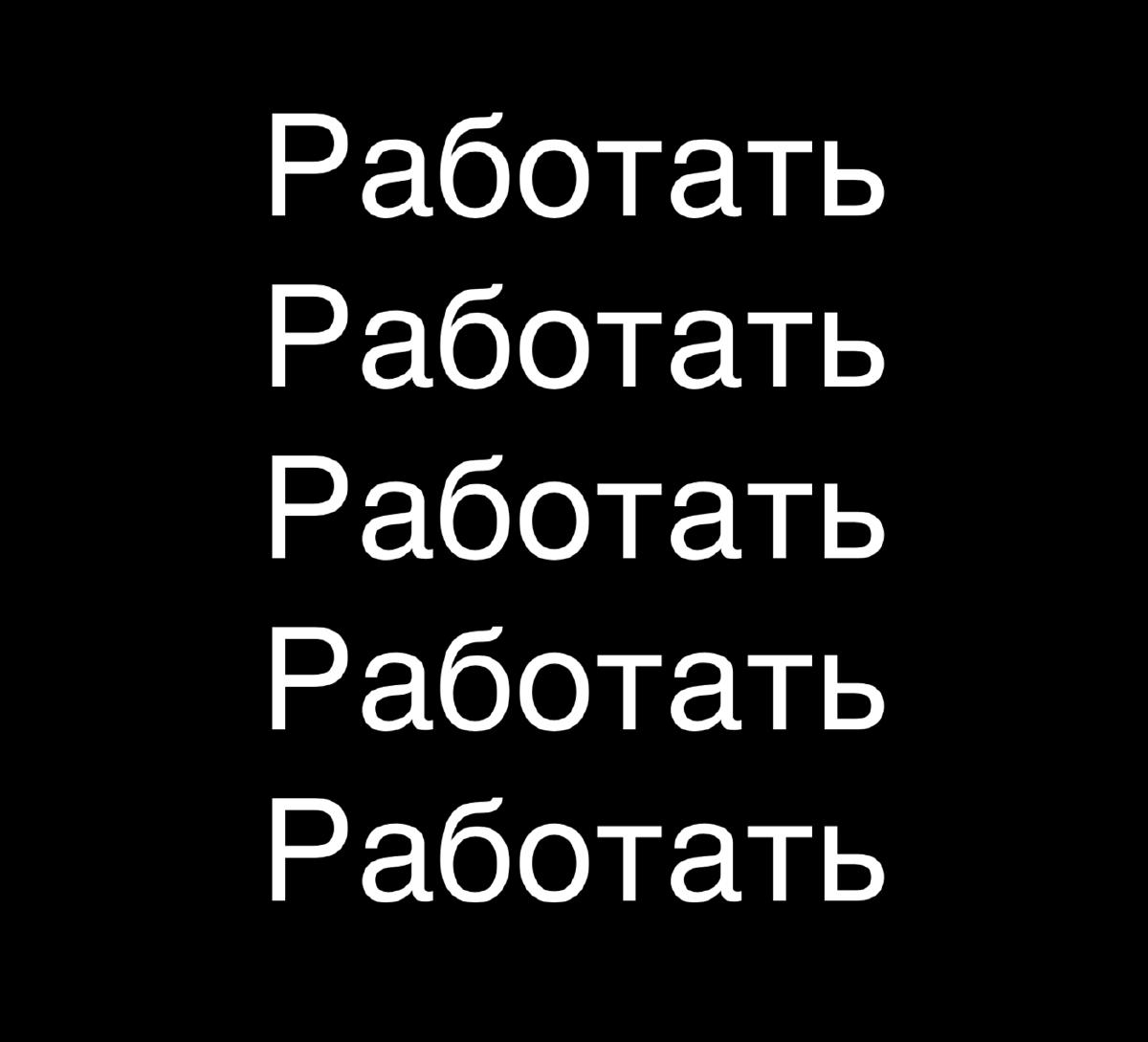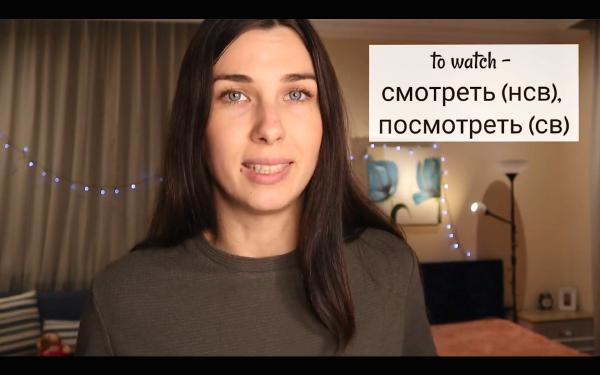First and Second Conjugation
Many Russian verbs end in -ать or -ить. Both categories have their own conjugations. Verbs ending in -ать follow the first or е/ё conjugation; if they end in -ить, then the second or и conjugation applies (exceptions and irregularities aside).
It is useful – and inevitable – to learn these conjugations. The same patterns recur frequently.
Learn Russian Verbs
The series Глаголы (verbs) from LearnRussian.org teaches you verbs in a manageable set of five at a time. Conjugations and applications in sentences, along with short stories and the voice of Anastacia.
Part 1 kicks off with the noble five: делать (to do), читать (to read), думать (to think), знать (to know), and понимать (to understand).
Part 2 also covers the first conjugation. The second conjugation is addressed in Part 3. You can find the entire series in the YouTube Playlist and on the Learn Russian website.
Russian Verbs: First Conjugation
Calm and thorough (but not very simple) is the introduction from Russian grammar. The first conjugation is shown below, featuring (besides читать and знать) the verbs писать (to write) and жить (to live). One has irregularities, and the other doesn’t even end in -ать yet still follows the first conjugation.
The second conjugation is treated here.
Introduction to Verb Conjugation
This too is a lot and at a higher level, in 14 minutes. With an explanation (in the я and они forms) on when to use у and when to use ю. The verb писать also appears again, with a warning useful for those who don’t want to confuse writing with urinating (from 6:48).
First Conjugation
The verb often ends in -ать; determine the stem (remove the last 2 letters) and add:
| думать | жить | ||
|---|---|---|---|
| я | ю / у | думаю | живу |
| ты | ешь / ёшь | думаешь | живёшь |
| он(а) | ет / ёт | думает | живёт |
| мы | ем / ём | думаем | живём |
| вы | ете / ёте | думаете | живёте |
| они | ют / ут | думают | живут |
Use ю and ют after vowels, and у and ут after consonants.
Use е in an unstressed syllable, and ё in a stressed one.
Exceptions
Verbs ending in -ять, -еть, -овать, -нуть, -ти, and -чь also follow the first conjugation, like гулять (to walk), болеть (to be sick), рисовать (to draw), отдохнуть (to rest/relax), идти (to go/walk), and мочь (to be able to).
Some verbs end in -ить but follow the first conjugation, such as (besides жить, to live) брить (to shave), шить (to sew), пить (to drink), бить (to hit), and лить (to pour).
Second Conjugation
The verb often ends in -ить; determine the stem (remove the last 3 letters) and add:
| говорить | видеть | ||
|---|---|---|---|
| я | ю / у | говорю | вижу |
| ты | ишь | говоришь | видишь |
| он(а) | ит | говорит | видит |
| мы | им | говорим | видим |
| вы | ите | говорите | видите |
| они | ят / ат | говорят | видят |
Use ят and ют after vowels and soft consonants.
Use у and ат after the letters ж, ч, ш, and щ.
Exceptions
Some verbs end in -еть, -ать, or -ять but follow the second conjugation. These include (besides видеть, to see) смотреть (to look), ненавидеть (to hate), зависеть (to depend on), обидеть (to hurt), терпеть (to endure), вертеть (to spin), гнать (to drive), стучать (to knock), кричать (to shout), молчать (to be silent), слышать (to hear), дышать (to breathe), держать (to hold), спать (to sleep), лететь (to fly), сидеть (to sit), лежать (to lie), and стоять (to stand).
For more on irregular verbs, see the Table of Russian Irregular Verbs (Russian Learn), and The Ultimate Guide to Russian Verbs: Both Irregular and Regular (Speechling).
More
First Conjugation
- Russian Verbs: 1st Conjugation (Alfia, 2019, 13 m)
- Conjugation of Russian verbs | To do, know, get, think, work – First conjugation (Daria Mikhay, 2018, 6 m)
- Russian verb conjugation Basics – 1st and 2nd conjugation (RUSLOproject, 2013, 9 m)
Second Conjugation
- Conjugation of Russian verbs | To look, come, see, find, believe – Second conjugation (Daria Mikhay, 2018, 8 m)
- Verbs of the Second Conjugation Ending in -еть (Russian with Russian, 2017, 5 m)
-
Russian Grammar Lesson 20: Second Conjugation Verbs (Fun Russian, 2013, 3 m)
First and Second Conjugation
- Russian verbs conjugation (Help my Russian, 2019, 4 m)
- How To Conjugate Verbs in Russian Language (Be Fluent in Russian, 2019, 2 m)
- Learn to conjugate Russian Verbs in Present Tense (with Personal Pronouns) (Russian Comprehensive, 2019, 12 m)
- Best Russian Conjugation Video (Be Fluent in Russian, 2019, 7 m)
- Russian Verb Endings (“Е” and “И” Conjugations) (Learn Russian Now, 2019, 15 m)
- Russian verb conjugation / Two types of conjugation (Live Russian, 2018, 4 m)
- Russian verbs conjugation (Real Russia Club, 2018, 52 m)
- Conjugations | Russian Language (Be Fluent in Russian, 2016, 9 m)
- Conjugation of verbs – 1st, 2nd – спряжение русских глаголов (A. Romaker, 2014, 14 m)
It’s worth mentioning: there are not just two conjugations, but forty. See/says The Biggest Lie About the Russian Verb Conjugation System (Boost Your Russian, 2019, 7 m).
Help/Reference/More
- 8 Simple Rules for Russian Verb Conjugation (ThoughtCo)
- Conjugation of Russian verbs (Learning Russian)
- Present Tense of Russian Verbs (Study Russian Online)
- Present Tense of Verbs. Conjugation of verbs жить, писать (Russian For Everyone)
- Russian Verb Conjugation (With examples, audio and quizzes) (Russian Verb Conjugation)
- Russian Verbs Conjugations (Master Russian)
- The Present Tense in Russian (Master Russian)
- Russian Verb Conjugator (Cooljugator)
- Russian Verbs – Present Tense (Russian Lessons)
More








